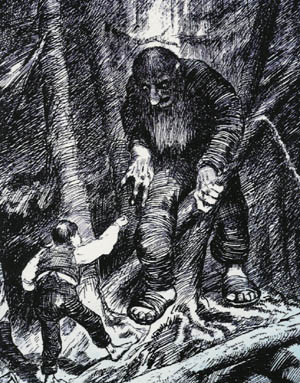The Boy Who Had an Eating Match with a Troll facts for kids
Quick facts for kids The Boy Who Had an Eating Match with a Troll |
|
|---|---|

Illustration by Theodor Kittelsen, Meeting the troll
|
|
| Folk tale | |
| Name | The Boy Who Had an Eating Match with a Troll |
| Data | |
| Country | Norway |
The Boy Who Had an Eating Match with a Troll (which is Askeladden som kappåt med trollet in Norwegian) is a famous fairy tale from Norway. It was collected by two well-known storytellers, Asbjørnsen and Moe. In this story, a troll is shown as not very smart and having poor eyesight. The main character, a clever boy, uses his wits to trick the troll and win an eating contest.
Contents
The Clever Boy and the Troll's Challenge
Once upon a time, a farmer had three sons. He sent them to cut wood in his forest. This was to help pay off some family debts.
When the two older sons went into the forest, a big, scary troll appeared. The troll threatened them, and they quickly ran away. They were too scared to cut any wood.
Then it was the turn of the youngest son. He is known as Askeladden in Norway, which means 'Ash-lad'. In some stories, he is called Boots. Before he left, he asked his mother for a good meal.
When Askeladden met the troll, the troll also threatened him. But Askeladden was not scared. He pulled out a piece of cheese. He pretended it was a stone and squeezed it hard. Whey, which is the watery part of milk, came out of the cheese.
Askeladden then told the troll he would deal with him just like he dealt with the "stone." The troll was surprised and a bit scared. He thought Askeladden was incredibly strong. Because of this, the troll offered to help Askeladden cut the wood.
The Troll's Home and a Tricky Task
After cutting wood, the troll suggested that Askeladden come home with him. When they arrived, the troll went to build up the fire. He then sent Askeladden to fetch water.
The troll gave Askeladden huge buckets to carry. Askeladden quickly realized he could not carry such big buckets. Instead of trying, he came up with a clever plan.
He told the troll that the buckets were too small. He said he would just bring the entire spring instead! The troll did not want to lose his spring. So, he quickly offered to switch chores with Askeladden.
The Eating Contest and a Smart Trick
Soon, the porridge was ready. The troll and Askeladden decided to have an eating contest. Askeladden started eating, but he had a secret plan. He put most of the porridge into his scrip, which is a small bag, instead of his stomach.
When his scrip was full, he quietly cut a hole in it. This way, the porridge just fell out, and he could keep "eating." The troll watched, amazed at how much Askeladden seemed to eat.
Finally, the troll said he could not eat any more. Askeladden then suggested a "trick." He told the troll that he could cut a hole in his own stomach. This would let him eat as much as he liked. Askeladden also said it did not hurt much at all.
The foolish troll believed Askeladden. He cut a hole in his own stomach and sadly died. Askeladden then took the troll's gold and silver. He used it to pay off his family's debt, making them rich.
Film Adaptation
The story of The Boy Who Had an Eating Match with a Troll was made into a puppet animation film in 1967. The movie was directed by Ivo Caprino. The film's title was Gutten som kappåt med trollet. The movie credits Peter Christen Asbjørnsen for collecting the tale. However, the book Norwegian Folktales also says Jørgen Moe helped collect it.
 | Chris Smalls |
 | Fred Hampton |
 | Ralph Abernathy |

